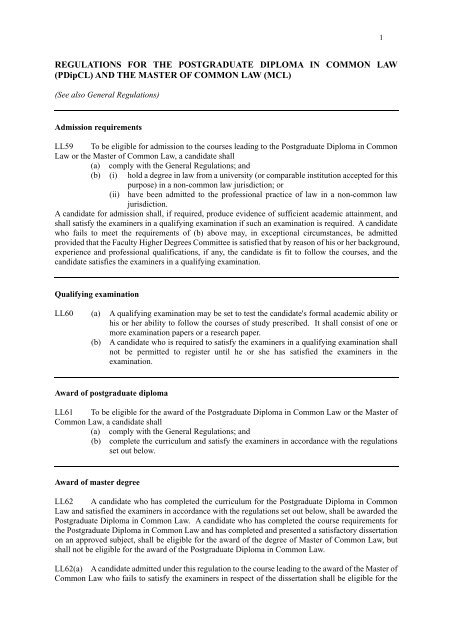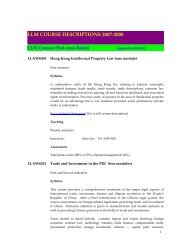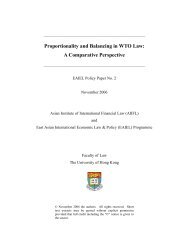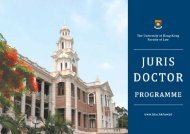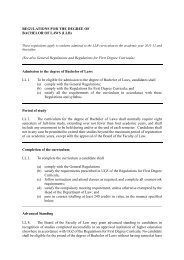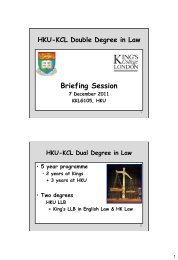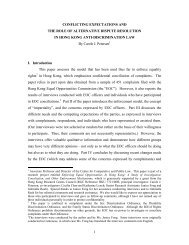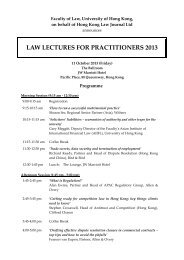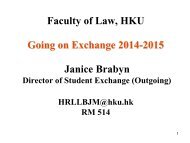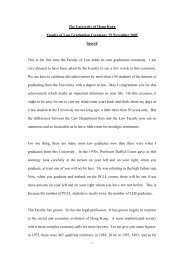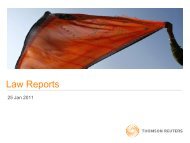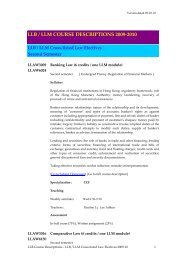REGULATIONS FOR THE DEGREE OF - Faculty of Law, The ...
REGULATIONS FOR THE DEGREE OF - Faculty of Law, The ...
REGULATIONS FOR THE DEGREE OF - Faculty of Law, The ...
Create successful ePaper yourself
Turn your PDF publications into a flip-book with our unique Google optimized e-Paper software.
2award <strong>of</strong> the Postgraduate Diploma in Common <strong>Law</strong>.CurriculumLL63 <strong>The</strong> curriculum for the Postgraduate Diploma in Common <strong>Law</strong> shall normally extend overone year <strong>of</strong> full-time study. To complete the curriculum a candidate shall(a) follow instruction;(b) satisfactorily complete all prescribed written and other work;(c) satisfy the examiners in each <strong>of</strong> a total number <strong>of</strong> subjects amounting to at least 48credits in value and selected (with the approval <strong>of</strong> the Programme Director) from thesubjects listed in the Syllabuses below.Candidates may also be permitted to take subjects from the Master <strong>of</strong> <strong>Law</strong>s (LLM) curriculum, subjectto approval <strong>of</strong> the Programme Director. For this purpose, a one-unit LLM subject shall be regarded as a6-credit subject, and a two-unit LLM subject shall be regarded as a 12-credit subject.LL63(1) In the case <strong>of</strong> the Master <strong>of</strong> Common <strong>Law</strong>, a candidate shall satisfactorily complete adissertation pertaining to LL64 in addition to the requirements set out in LL63 (a) to (c) above.DissertationLL64 (a) <strong>The</strong> title <strong>of</strong> the dissertation shall be submitted for approval by not later than Dec 31 inthe first semester <strong>of</strong> the same academic year in which the curriculum for thePostgraduate Diploma in Common <strong>Law</strong> ends, and the dissertation shall be presented bynot later than August 31 <strong>of</strong> the second semester <strong>of</strong> the same academic year.(b) In exceptional circumstances a candidate may apply to the <strong>Faculty</strong> Higher DegreesCommittee for an extension <strong>of</strong> the period within which the dissertation or the title mustbe presented.(c) <strong>The</strong> candidate shall submit a statement that the dissertation represents his or her ownwork undertaken after registration as a candidate for the degree.(d) <strong>The</strong> examiners may require an oral examination on the subject <strong>of</strong> the dissertation.ExaminationsLL65 Any candidate who has failed to pass a subject or subjects in the manner provided for in theseRegulations may be permitted(a) to sit a supplementary examination; or(b) to repeat the subject or subjects by following the course <strong>of</strong> instruction and taking theprescribed examination, or by taking the prescribed examination without following thecourse <strong>of</strong> instruction; or(c) to undertake the study <strong>of</strong> any alternative subject or subjects which enable completion <strong>of</strong>the curriculum.LL66 A candidate who has failed to pass a subject or subjects shall be recommended for thediscontinuation <strong>of</strong> study under General Regulation G12 if not permitted to attend for examination at someother time or to sit a supplementary examination or to repeat the subject or subjects or to undertake thestudy <strong>of</strong> another subject or subjects which enable completion <strong>of</strong> the curriculum.LL67 A candidate who is unable through illness or other acceptable reason to attend for examinationmay apply for permission to attend for examination at some other time.
7management <strong>of</strong> land.Security interests: mortgages; charges; pledges; liens.LLAW2007 and LLAW2008Equity and Introduction to Trusts I and IIHistory and nature <strong>of</strong> equity; equitable obligations (fiduciary obligations, breach <strong>of</strong> confidence otherthan trade secrets); equitable remedies (account, recession, compensation, Lord Cairns' Act,injunction).History and nature <strong>of</strong> trusts; creation <strong>of</strong> express trusts (the three certainties, formal requirements,constitution <strong>of</strong> trusts); <strong>of</strong>fshore trusts; pension trusts in Hong Kong; administration <strong>of</strong> trusts; variation<strong>of</strong> trusts; the duties <strong>of</strong> trustees and rights <strong>of</strong> beneficiaries; liability for breach <strong>of</strong> trust, personal andproprietary; resulting and constructive trusts.LLAW3002Guided research (12 credits)An individual research project on an approved topic carried out under the supervision <strong>of</strong> an assignedteacher, resulting in the submission <strong>of</strong> a research paper not exceeding 10,000 words (excluding tables <strong>of</strong>cases and statutes, notes, appendices and bibliographies).Instruction will be given on the principles <strong>of</strong> legal writing and in legal research methodology andtechniques including standard library research aids and tools and use <strong>of</strong> electronic databases.Students taking this course as their Designated Research Course (see LL3(iii)) will be required to makean oral presentation on their research topic and methodology prior to the submission <strong>of</strong> the writtenresearch paper. <strong>The</strong> oral presentation will form part <strong>of</strong> the assessment in this course.LLAW3003Human rights lawCultural, historical and juridical background.Domestic protection <strong>of</strong> human rights under the common law and by constitutional entrenchment.Enforcement <strong>of</strong> human rights; principles <strong>of</strong> interpretation.<strong>The</strong> content <strong>of</strong> substantive rights, including the following: life, self-determination, liberty and security<strong>of</strong> the person, freedom <strong>of</strong> movement, nationality, privacy, conscience, expression, association, assembly,equality, property, employment and education.Human rights in a state <strong>of</strong> emergency.9-credit CoursesLLAW1007Legal SkillsHow to read and use cases; a brief history <strong>of</strong> law reports; the law reports <strong>of</strong> Hong Kong and othercommon law jurisdictions; finding cases in law reports; reading and finding statutes; the rules andpractices <strong>of</strong> statutory interpretation; the use <strong>of</strong> reference work for lawyers; finding and using materialsin law journals; an introduction to computers, e-mail and the internet; the implications <strong>of</strong> the"information society"; using electronic research materials in law; using international legal materials;conceptualizing research questions, formulating strategies and tackling research problems; the correctcitation <strong>of</strong> legal materials and the avoidance <strong>of</strong> plagiarism; planning and organizing written work; andintroduction to legal drafting.
8<strong>The</strong> teaching method will rely more on "hands-on" exercises rather than instruction. Many <strong>of</strong> the skillsdeveloped in the course, including those <strong>of</strong> group work, are "life skills" as well as work and study skills,and are intended to lay the foundation for life-long learning.6-credit CoursesLLAW1008<strong>The</strong> legal systemAn overview <strong>of</strong> legal systems (types and components <strong>of</strong> legal systems, classification <strong>of</strong> law, sources <strong>of</strong>law, and the background to the Hong Kong legal system); the ideology <strong>of</strong> the Hong Kong legal system(justice, the rule <strong>of</strong> law, and the separation <strong>of</strong> powers doctrine); the structure <strong>of</strong> the courts; the jurysystem; legislative bodies; sources <strong>of</strong> law (the meaning and theory <strong>of</strong> the common law and its presentreception in the SAR, local "Chinese law and custom" or "customary law", mainland Chinese law,statute law); the legal pr<strong>of</strong>ession and legal services; the Secretary <strong>of</strong> Justice; an introduction to criminaland civil procedure.LLAW2009Introduction to PRC lawA general overview <strong>of</strong> the present legal system and law <strong>of</strong> the PRC. <strong>The</strong> course begins with a survey <strong>of</strong>traditional Chinese law and the development <strong>of</strong> socialist theory and practice before and after 1949. It thenprovides an introduction to important areas <strong>of</strong> legislation enacted since 1979, including:Legal traditionConstitutional reform: courts, procuracy and lawyers<strong>The</strong> criminal processAdministrative litigationMarriage law and the status <strong>of</strong> womenIntroduction to civil law (focus on contract)Mediation and dispute settlementLLAW3001Introduction to legal theory<strong>The</strong> nature <strong>of</strong> law and laws: the central questions <strong>of</strong> legal theory, the relationship between law andmorality, the function <strong>of</strong> law in society, the concepts and techniques used in the operation <strong>of</strong> developedlegal systems.Legal positivism: the command theory <strong>of</strong> law: Bentham and Austin; Hart's concept <strong>of</strong> law; Kelsen'spure theory <strong>of</strong> law.Natural law and natural rights: Finnis, Dworkin, the nature <strong>of</strong> rights.Legal realism; historical jurisprudence; legal reasoning; the future <strong>of</strong> the law in Hong Kong.LLAW3006AdmiraltyIntroduction: maritime law; the Hong Kong legislation; public control <strong>of</strong> shipping and navigation inHong Kong waters; control <strong>of</strong> marine pollution.<strong>The</strong> ship: the ship as property; registration; purchase and sale; ship mortgages; liens; construction,maintenance and equipment; master and crew.<strong>The</strong> running <strong>of</strong> the ship: contract <strong>of</strong> passage; contract <strong>of</strong> affreightment; charter-parties; loading and
9discharge; bills <strong>of</strong> lading; exclusion and limitation <strong>of</strong> liability; the Hague Rules; general average.Navigation, safety at sea and collisions: the collision regulations; Hong Kong harbour regulations;collisions and liability for damage; limitation <strong>of</strong> liability.Salvage, towage and wreck.Marine insurance: history; course <strong>of</strong> business at Lloyds; insurable interest; indemnity; utmost goodfaith; types <strong>of</strong> policy; perils insured against; contents <strong>of</strong> policies; losses and other incidents <strong>of</strong> liability;rights <strong>of</strong> insurers; assignment <strong>of</strong> policies; mutual insurance.LLAW3007Alternative dispute resolutionThis course will examine the traditional methods <strong>of</strong> dispute resolution such as judicial adjudication, andconsider alternative dispute resolution from both a Hong Kong and an Asian perspective.This course is composed <strong>of</strong> two main parts:(a) an introduction to traditional methods <strong>of</strong> dispute resolution and a critique <strong>of</strong> their advantages anddisadvantages; and(b) an examination <strong>of</strong> alternative dispute resolution methods, which will cover the following:(i) the origin and development <strong>of</strong> the alternative dispute resolution movement, and(ii) an in-depth study <strong>of</strong> the following methods: confidential private listening; negotiation,mediation and conciliation; arbitration; good <strong>of</strong>fices/ombudsman; mini-trials/summary jury trails;private courts, dispute resolution centres and online web-based ADR schemes.<strong>The</strong>se methods <strong>of</strong> alternative dispute resolution will be examined by considering their present andpotential application in Hong Kong and other parts <strong>of</strong> Asia, in such areas as: administrative complaints,commercial and construction disputes (both domestic and international), labour relations, landlord andtenant disputes and matrimonial disputes. Students will also engage in role playing exercises insimulated negotiation, mediation and arbitration with video taped assessment.LLAW3008Bank securityLending and securities: the role <strong>of</strong> banks in trade and other financing; lending criteria; forms <strong>of</strong>securities; securities over goods and documents <strong>of</strong> title to goods including pledges, hypothecation andliens; financing <strong>of</strong> international trade including letters <strong>of</strong> credit, documentary bills <strong>of</strong> exchange, letters<strong>of</strong> guarantee and performance bonds; effect <strong>of</strong> Bills <strong>of</strong> Sale legislation; guarantees and sureties; set-<strong>of</strong>f;fixed and floating charges; enforcement and realization <strong>of</strong> securities; general discussion <strong>of</strong> loandocumentation.Duties <strong>of</strong> banker in taking securities: undue influence; mistake; misrepresentation; duties to inform ordisclose to customer and third parties.Court proceedings affecting banker: garnishee proceedings; Mareva injunctions; disclosure orders;insolvency <strong>of</strong> customer; banker's liability as constructive trustee; jurisdiction and conflict <strong>of</strong> lawsespecially in regard to international banking.(Note: Unless exempted, candidates are required to have taken Banking law before taking this course.)LLAW3009Banking lawRegulation <strong>of</strong> financial institutions in Hong Kong: regulatory framework; role <strong>of</strong> the Hong KongMonetary Authority; money laundering, recovery <strong>of</strong> proceeds <strong>of</strong> crime and anti-terrorist measures.Banker-customer relationship: nature <strong>of</strong> the relationship and its development; meaning <strong>of</strong> "customer"and types <strong>of</strong> accounts; banker's rights as against customer including appropriation <strong>of</strong> payment, lien andset-<strong>of</strong>f; duties <strong>of</strong> banker including confidentiality and payment <strong>of</strong> customer's cheques; money paid bymistake; forgery; banker's liability as constructive trustee; implied duties <strong>of</strong> the customer; contractualattempts to modify such duties; supply <strong>of</strong> banker's references; banker as adviser; termination <strong>of</strong> the
10relationship.Lending and securities: the role <strong>of</strong> banks in trade and other financing; lending criteria; forms <strong>of</strong>securities; financing <strong>of</strong> international trade and bills <strong>of</strong> exchange; guarantees and sureties; fixed andfloating charges; credit cards and other types <strong>of</strong> consumer credit; enforcement and realization <strong>of</strong>securities; general discussion <strong>of</strong> loan and security documentation.Taking effective securities: undue influence; mistake; misrepresentation.LLAW3010Business associationsOutline <strong>of</strong> different types <strong>of</strong> business associations.Partnership: their nature and creation and the rights and duties <strong>of</strong> the partner inter se and vis-a-vis thirdparties.Registered companies: their development and nature; problems relating to incorporation; separatecorporate personality; limited liability; memorandum and articles <strong>of</strong> association; ultra vires doctrine; anoverview <strong>of</strong> membership, management and control.LLAW3011Chinese laws governing foreign investments<strong>The</strong> course will examine the laws and regulations governing foreign investment in China. <strong>The</strong> focus isnot so much on an analytical study <strong>of</strong> each individual enactment, but on how they all come together tocreate the present legal and business regime and culture in which foreign investors are to function.<strong>The</strong> course will consider the laws governing the activities <strong>of</strong> foreign investment enterprises (e.g. foreignexchange, labour issues, organizing subsidiaries), foreign investment forms (e.g. equity joint ventures,co-operative joint ventures, wholly foreign-owned enterprises), restricted investments (e.g. banking,other financial services, telecommunications, retail and wholesale trade) and corporate organizations(e.g. companies limited by shares, conversion <strong>of</strong> state-owned enterprises, holding companies andmergers). <strong>The</strong> many practical difficulties faced by foreign investors, and the limitations <strong>of</strong> the currentlegal framework will be examined.LLAW3012Civil litigationIntroduction to civil procedure: an overview <strong>of</strong> the civil process including preliminary considerationsbefore action, commencement, parties, pleadings, discovery, motions, pre-emptive strikes, trial, appeal,enforcement <strong>of</strong> judgments; judicial review, administrative litigation and other variations.Introduction to advocacy: a consideration <strong>of</strong> how a party's legal position is presented, including theoriesand strategies <strong>of</strong> litigation, viva voce and other types <strong>of</strong> evidence, oral argument and appellate advocacy,negotiation and settlement, ethical considerations.Critique <strong>of</strong> the trial process: an examination <strong>of</strong> the traditional adversarial process including adversarialand non-adversarial systems in other jurisdictions, and various forms <strong>of</strong> alternative dispute resolutionwithin the adversarial context.LLAW3013Commercial law ISale <strong>of</strong> goods: formation and subject matter <strong>of</strong> contract; duties <strong>of</strong> seller: title, quality, quantity, delivery;duties <strong>of</strong> buyer: transfer <strong>of</strong> property and risk; frustration and other discharge; seller's remedies; buyer'sremedies.Acquisition <strong>of</strong> goods from non-owner: nemo dat and exceptions.
11LLAW3014Commercial law IIConsumer protection: product liability; statutory duties; exemption clauses and control there<strong>of</strong>.Personal property security interest: retention <strong>of</strong> title, hire-purchase, finance lease, sale and mortgagehire back, chattel mortgage, etc.Carriage and storage <strong>of</strong> goods: general introduction with emphasis on carriers and warehousemen asbailees.LLAW3015Company lawCapital: the nature and types <strong>of</strong> capital; raising, maintenance and reduction <strong>of</strong> capital; shares: transferand registration, purchase by a company and financial assistance for purchase <strong>of</strong> its own shares;dividends, distributable pr<strong>of</strong>its.Corporate borrowing: debentures, company charges, floating charges, registration, remedies <strong>of</strong> charge.<strong>The</strong> governance <strong>of</strong> a company: members, general meetings; directors, the position and duties <strong>of</strong>directors; board meetings; conflict <strong>of</strong> interest; majority rule, minority protection; external regulation,disclosure, notifications, annual return, audits, inspections and investigations.Corporate failure: reconstructions and schemes and winding-up (overview).Listed companies: regulation; public issues; mergers, acquisitions and takeovers.LLAW3016Comparative law<strong>The</strong> common law system provides principles and methods for responding to society's needs and values.Some <strong>of</strong> those principles and methods will be compared with the legal and extra-legal equivalents innon-common law nations. <strong>The</strong> influence <strong>of</strong> special social and economic characteristics will be noted.Appropriate jurisprudential theory will be discussed.<strong>The</strong>re will be case studies <strong>of</strong> one or both <strong>of</strong> the following:<strong>The</strong> Constitutions <strong>of</strong> the People's Republic <strong>of</strong> China and the U.S.S.R. with those <strong>of</strong> selectedcommon law jurisdictions (e.g. U.K., U.S.A., Australia);<strong>The</strong> principles <strong>of</strong> the civil law <strong>of</strong> selected European nations with equivalent common lawprinciples, taking special note <strong>of</strong> the harmonization policy <strong>of</strong> the E.E.C.LLAW3017Copyright lawEconomic, social and other justifications for copyright protection.Requirements for copyright protection under the relevant copyright statutes.Rights subsisting under a copyright and its infringement.<strong>The</strong> law relating to industrial designs.Reforms <strong>of</strong> copyright law.Comparative study <strong>of</strong> copyright law in the People's Republic <strong>of</strong> China and/or Taiwan.LLAW3018CriminologyCriminology involves a study <strong>of</strong> the phenomenon <strong>of</strong> crime and will involve a consideration <strong>of</strong> thefollowing areas: the definition and nature <strong>of</strong> crime; the justification and theories <strong>of</strong> punishment; thevarious schools which provide perspectives on the understanding <strong>of</strong> the etiology <strong>of</strong> crime; the treatment<strong>of</strong> the <strong>of</strong>fender and crime prevention and control.
12LLAW3019Current legal controversies<strong>The</strong> main objective <strong>of</strong> this course is to examine two or more topical legal issues in Hong Kong and placethem in their social and political context. This will both encourage a more pr<strong>of</strong>ound understanding <strong>of</strong>`law in action' in specified areas, and serve as an opportunity to bring students up to date in subjects theyhave studied, but which may have changed in important respects since they studied them. It also allowsfor a broader analysis <strong>of</strong> legal problems, their genesis, development and effect than is possible in othercourses. This analysis seeks where possible to straddle the borders <strong>of</strong> discrete law subjects and toconsider the general question <strong>of</strong> the reform <strong>of</strong> the law.LLAW3020Economic analysis <strong>of</strong> law<strong>The</strong> course will begin with a brief review <strong>of</strong> the major forms <strong>of</strong> law and economics scholarship.Introduction to basic concepts such as moral hazard, adverse selection, collective action, free ride,prisoner's dilemma, tragedy <strong>of</strong> the commons, and externalities will be provided during the beginning <strong>of</strong>the course. <strong>The</strong>reafter, discussion will enter into areas such as contracts, property, torts, corporations,and collective decision making. <strong>The</strong> course will end with the major criticisms <strong>of</strong> the law and economicsscholarship.<strong>The</strong> course is not designed to teach law per se in any <strong>of</strong> these areas, but instead uses examples fromthese areas to highlight the economic tools and concepts and to show their usefulness in many areas <strong>of</strong>the law.LLAW3021Fundamentals <strong>of</strong> evidence and trial procedureWhat may be proved: facts in issue; relevance; admissibility and weight.Functions <strong>of</strong> judge and jury: who decides; judicial discretion.Burden <strong>of</strong> pro<strong>of</strong>: standard <strong>of</strong> pro<strong>of</strong>; presumptions.Methods <strong>of</strong> pro<strong>of</strong>: oral testimony; documentary evidence; real evidence, pro<strong>of</strong> without evidence.Oral testimony: competence, compellability <strong>of</strong> witnesses; questioning <strong>of</strong> witnesses including rules reprevious consistent statements, refreshment <strong>of</strong> memory and collateral issues; corroboration <strong>of</strong> witnesses;identification evidence.Hearsay: scope, rationale, problem areas.Common law exceptions to hearsay: informal admissions especially confessions; other common lawexceptions.Statutory exceptions to hearsay.Evidence <strong>of</strong> character <strong>of</strong> parties.Privilege and public interest immunity.Similar fact evidence.Opinion and expert evidence.LLAW3022Human rights in Hong KongHistory <strong>of</strong> enactment, the Bill <strong>of</strong> Rights Regime, ICCPR, implementation <strong>of</strong> human rights treaties,Basic <strong>Law</strong>, interpretation, scope <strong>of</strong> application, inter-citizen rights, locus standi, permissible limitations,derogation and reservation, enforcement and remedy.Study <strong>of</strong> selected rights, including civil and political rights, economic, social & cultural rights andpeople's rights. Topics covered include impact on civil and criminal process, right to a fair and publictrial, arrest, search and seizure, torture and degrading treatment, liberty and security <strong>of</strong> person, freedom
13<strong>of</strong> association and assembly, freedom <strong>of</strong> expression, right to nationality, right to family, right to politicalparticipation, discrimination and equality, right to housing, social securities, education andenvironment.LLAW3023Insolvency law<strong>The</strong> law <strong>of</strong> bankruptcy, and <strong>of</strong> winding up and dissolution <strong>of</strong> companies, and the recovery <strong>of</strong> debtsgenerally. Acts <strong>of</strong> bankruptcy, commencement, the petition, bankruptcy <strong>of</strong> a firm, appointment <strong>of</strong> areceiver, adjudication, compositions and schemes <strong>of</strong> arrangement, consequences <strong>of</strong> bankruptcy,criminal bankruptcy, disabilities, discharge.<strong>The</strong> failure <strong>of</strong> a company's business from the directors' and members' view-point, the decision to windup and consequences <strong>of</strong> delay, the effect <strong>of</strong> prior receivership and the claims <strong>of</strong> secured creditors onwinding up in general.Winding up by the Court, the petition, winding up orders and their consequences, the role <strong>of</strong> theliquidator. Voluntary winding up, its general procedures and consequences, preferential debts, effect <strong>of</strong>winding up on antecedent and other transactions, pro<strong>of</strong> <strong>of</strong> debts, dissolution, the lawyer's role.LLAW3024Insurance lawRegulation <strong>of</strong> the insurance industry, types <strong>of</strong> insurance, indemnity and non-indemnity insurance, theinsurance contract, renewal, indemnity, contribution, subrogation, insurable interest, the duty <strong>of</strong> utmostgood faith, disclosure, the proposal as the basis <strong>of</strong> the contract, promissory warranties, waiver,definition <strong>of</strong> the risk, limits <strong>of</strong> liability, exceptions and conditions, third parties rights against the insurer,double insurance, pr<strong>of</strong>essional indemnity, motor insurance, personal life insurance, and marineinsurance.LLAW3025International commercial litigation<strong>The</strong> course will examine in depth a number <strong>of</strong> important public and private international law issuesfrom the perspective <strong>of</strong> international commercial litigation.<strong>The</strong> areas to be covered may include: introduction to litigation and procedure in Hong Kong, Marevainjunctions and Anton Piller orders, the jurisdiction <strong>of</strong> Hong Kong courts over persons, firms andcorporations, extended jurisdiction under HCR, Order 11, the exercise <strong>of</strong> discretion on the grounds <strong>of</strong>lis alibi pendens and forum non conveniens, choice <strong>of</strong> jurisdiction clauses, and res judicata. Referencewill be made to the position in other countries, e.g. Australia, Canada, the USA and Mainland PRC, aswell as in Europe under the Brussels and Lugano Conventions.<strong>The</strong> course will also deal with the issue <strong>of</strong> state immunity, the taking <strong>of</strong> evidence in other jurisdictions,and the enforcement <strong>of</strong> foreign judgements and arbitral awards in Hong Kong under the common lawand statutory regimes.LLAW3026International human rights<strong>The</strong> course will include a common element and an optional component. <strong>The</strong> common element is dividedinto two parts: (a) conceptual issues and (b) modalities for prescribing, invoking, appraising andimplementing human rights. <strong>The</strong> first part will include an introduction to the concept <strong>of</strong> human rightsand development <strong>of</strong> international human rights law. <strong>The</strong> second part will examine the techniques andprocedures in protecting human rights, including reporting procedure, fact-finding commission, roleand functions <strong>of</strong> various <strong>of</strong>ficial institutions and non-governmental organizations, domestic absorption<strong>of</strong> international standards, sanctions and humanitarian intervention.<strong>The</strong> optional component will vary from year to year, depending on teachers' expertise and students'
14interest. It will cover one or more <strong>of</strong> the following areas: (a) an in-depth study <strong>of</strong> one <strong>of</strong> the humanrights conventions, such as the European Convention on Human Rights, the Convention AgainstTorture or the Inter-American Convention <strong>of</strong> Human Rights, their modus operandi, cases and practices,and a critical appraisal <strong>of</strong> the system; (b) a study on contemporary international human rights issues,such as protection <strong>of</strong> minorities, non-discrimination, nationality and refugees; (c) a comparative study<strong>of</strong> constitutional protection <strong>of</strong> human rights in selected countries.LLAW3027International organizationsInternational organizations: their developing importance especially in regional affairs; theirconstitutions; their law-making roles and methods; the importance <strong>of</strong> consensus, package deals andweighted votes; their status within the framework <strong>of</strong> international law.A selection will be made from the following case studies:<strong>The</strong> United Nations Conference on the <strong>Law</strong> <strong>of</strong> the Sea (UNCLOS III);Regional economic organization: the Pacific Forum, the Organization <strong>of</strong> American States, theOrganization <strong>of</strong> African Unity;Regional defence organization: NATO, the Warsaw Pact.LLAW3028International trade law IInternational trade terms and the use <strong>of</strong> documents in export sales; contract issues in the internationaltrade context; China trade comparisons; attempts at standardisation, codification and unification; HongKong regulation <strong>of</strong> international sales transactions; bills <strong>of</strong> exchange; collections; documentary credits;bank guarantees and performance bonds; export credit insurance.LLAW3029International trade law IICarriage by sea; carriage by air; multi-modal transport and containerisation; marine insurance;commercial arbitration regimes in Hong Kong and abroad; public regulation <strong>of</strong> international tradeincluding aspects <strong>of</strong> the General Agreement on Tariffs and Trade and Multi-fibre Agreement.LLAW3030Introduction to private international lawThis course is intended to provide a basic introduction to the area <strong>of</strong> conflict <strong>of</strong> laws. It will provide anoverview <strong>of</strong> the nature and theories <strong>of</strong> the conflict <strong>of</strong> laws; fundamental concepts; classification,characterization and renvoi; domicile and the status <strong>of</strong> individuals and corporations; the jurisdiction <strong>of</strong>local courts; the recognition and enforcement <strong>of</strong> foreign law; procedure and pro<strong>of</strong> <strong>of</strong> foreign law; andthe harmonization <strong>of</strong> conflicts rules through international treaties.Problems <strong>of</strong> the choice <strong>of</strong> law in a number <strong>of</strong> the following areas will be considered: contracts, torts,property and succession.LLAW3031Issues in evidence and trial procedure<strong>The</strong> course is intended to provide an opportunity for (a) in depth study <strong>of</strong> specialist areas <strong>of</strong> the lawrelating to evidence and procedure and (b) introducing students to different approaches towardsproblems <strong>of</strong> pro<strong>of</strong> suggested by scholars in other disciplines, especially probability theory.Topics for study will be selected on a yearly basis from the following list: expert evidence; pre-trialdiscovery in civil cases; similar facts evidence; police practices and a fair trial; public interest immunity;
15interrogatories and other forms <strong>of</strong> admission; the use <strong>of</strong> forensic science; probability theory and pro<strong>of</strong>;comparative evidence and procedure; practical evidence - a simple case; admissibility/relevance <strong>of</strong> theconfessions <strong>of</strong> third persons; evasions <strong>of</strong> the hearsay rule; features and problems <strong>of</strong> identificationtestimony; pre-trial and attrial experiments; reforms; codification, together with any currentcontroversies or developments in the general area <strong>of</strong> evidence and procedure the teachers or studentsfind appropriate or interesting.(Note: Students enrolling for this course must have completed Fundamentals <strong>of</strong> evidence and trialprocedure or an equivalent course.)LLAW3032Issues in family lawThis course examines current controversial issues pertaining to family law. Topics examined includerights and obligations <strong>of</strong> husband and wife during marriage, on divorce and protection for children andthe weaker spouse.(Note: Students enrolling for Issues in family law should preferably have taken Principles <strong>of</strong> familylaw.)LLAW3033Issues in intellectual property lawThis course examines current controversial issues and problems in intellectual property law in thecontext <strong>of</strong> the circumstances <strong>of</strong> Hong Kong, with reference but not limited to the following areas:Passing <strong>of</strong>f action and other economic torts.Registration <strong>of</strong> trade marks relating to goods and trade marks relating to services.Copyright and designs: protection and infringement.Protection <strong>of</strong> confidence and privacy.Patents: requirements for grant and infringement.LLAW3034Labour law<strong>The</strong> scope and sources <strong>of</strong> labour law.<strong>The</strong> contract <strong>of</strong> employment: formation; obligations <strong>of</strong> parties, express and implied; termination andsuspension <strong>of</strong> the contract and remedies for breach; restraint <strong>of</strong> trade; apprenticeship.Statutes affecting employment terms in regard to formal requirements, wages, notice <strong>of</strong> termination;suspension, lay-<strong>of</strong>f and redundancy; hours <strong>of</strong> work, rest days and holidays; children, young persons andwomen; the Labour Tribunal.<strong>The</strong> employer's responsibility for the safety <strong>of</strong> his employees; negligence and breach <strong>of</strong> statutory duty;health, safety and welfare and other conditions <strong>of</strong> work in industry; enforcement; employeescompensation.<strong>The</strong> law <strong>of</strong> collective relations (in outline only).LLAW3035<strong>Law</strong> in East AsiaThis course will be the first opportunity for students in this <strong>Faculty</strong> to learn about the legal systems <strong>of</strong>the East Asian countries. <strong>The</strong> course will be taught thematically and comparatively from among thefollowing topics:An introduction to the historical foundations <strong>of</strong> the modern legal systems <strong>of</strong> Japan, South Koreaand Taiwan;Legal institutions: structure <strong>of</strong> state, courts, legal pr<strong>of</strong>essions;
16Codification <strong>of</strong> law, especially the institutions <strong>of</strong> private law;Civil and commercial law;Civil process and mediation;Rights <strong>of</strong> the accused person;Human rights and the legal status <strong>of</strong> women;Framework for foreign trade and investment.<strong>The</strong>se topics will be examined from a comparative perspective with reference to the law in Hong Kong.<strong>The</strong> law will be analysed in the context <strong>of</strong> its history as well as its economic, political and culturalfoundations.LLAW3036<strong>Law</strong>, justice and ideologySocial theory and the sociology <strong>of</strong> law: Pound, Erlich, Durkheim, Weber; law and social change.<strong>Law</strong> as ideology: law and power, Marxist theories <strong>of</strong> law and state, critical legal studies.<strong>The</strong>ories <strong>of</strong> justice: utilitarianism, the economic analysis <strong>of</strong> law, Rawls, Nozick, Hayek.LLAW3037<strong>Law</strong> <strong>of</strong> agency<strong>The</strong> nature and creation <strong>of</strong> agency relationship; the relationship and rights and duties <strong>of</strong> principal andagent inter se and vis-a-vis third parties; comparison <strong>of</strong> the ability <strong>of</strong> the ‘agent' to affect the‘principal’s’ legal position in contract, tort and property.LAW3038Legal fictions: representations <strong>of</strong> the law in literature, philosophy and cinemaThis course will examine the representation <strong>of</strong> law in a variety <strong>of</strong> contexts: literary, philosophical andcinematic. Issues such as justice, rights, the Rule <strong>of</strong> <strong>Law</strong>, positivism, the language <strong>of</strong> the law, the trialand the role <strong>of</strong> the pr<strong>of</strong>ession will be canvassed through ‘texts’ as varied as Plato's Republic,Sophocles's Antigone, Mary Shelley's Frankenstein, Melville's Bartleby the Scrivener, Dickens's A Tale<strong>of</strong> Two Cities (or, alternatively, Bleak House), Kafka's <strong>The</strong> Trial (or Before the <strong>Law</strong>), Dworkin's <strong>Law</strong>'sEmpire, Foucault's Discipline and Punish, Witness for the Prosecution, Judgment at Nuremberg andperhaps a sampling <strong>of</strong> various television series (‘Rumpole’, ‘L.A. <strong>Law</strong>’, ‘Perry Mason’, ‘Street Legal’and possibly that series that was stranger than fiction, the OJ Simpson trial).How the law is ‘imagined’ by these various ‘texts’ constitutes an important social document, unlocking,to a certain extent, the values -- moral, political, juridical -- <strong>of</strong> the culture that produced the document.But this course will argue that these representations <strong>of</strong> the law do more than just ‘hold up a mirror tonature’; indeed, they force us to rethink the law, reconceiving it, as well, as a representation -- in short ,a text, subject to the same conventions <strong>of</strong> aesthetic representation. So the course will conclude byexamining actual legal judgments, and how those judgments are informed by narrative conventions,plot structures, novelistic characterization and constitutive metaphors.LLAW3039Legal historyLLAW3040Medico-legal issuesThis course examine how the law regulates medical practice. Topics examined include consent tomedical treatment, abortion, pre-natal injuries, death and withholding life sustaining treatment,euthanasia, organ transplant, confidentiality and access to medical records.
17LLAW3041People's Republic <strong>of</strong> China civil and commercial lawThis course will begin with a discussion <strong>of</strong> the political economy <strong>of</strong> China's legal change. It will thenexamine the specific areas <strong>of</strong> the law from both a theoretical and practical approach. Topics addressedin the course include: contract law, the law on secured transactions, corporate law, securities regulation,and the foreign trade regime in the People's Republic <strong>of</strong> China.LLAW3042Planning and environmental lawPlanning and land use<strong>The</strong> government lease and land use control; Town Planning; Protecting the non-urban environment:country parks, marine parks, wetlands and the harbour; Environmental impact assessment;Pollution controlAir, noise, water pollution and waste; legislation and common law;<strong>The</strong> wider contextInternational environmental law as it applies to Hong Kong; Trade and the environment.LLAW3043Principles <strong>of</strong> family lawThis course covers basic principles <strong>of</strong> Hong Kong family law and its historical development. Itexamines marriage formation, nullity and legal consequences <strong>of</strong> marriage. It covers protection <strong>of</strong>spouse and children from domestic violence. This course also covers judicial separation, divorce andancillary relief. <strong>The</strong> law relating to children is also examined with emphasis on parental responsibility,child adoption and child protection from abuse and neglect. Also studied is the impact on family law <strong>of</strong>the UN Convention on the Rights <strong>of</strong> the Child and other international treaties binding on Hong Kong.LLAW3044Public international lawTopics will include some <strong>of</strong> the following: introduction to the nature <strong>of</strong> international law and itshistorical development; sources <strong>of</strong> international law; the relationship between international andmunicipal law; the subjects <strong>of</strong> international law; the concept <strong>of</strong> sovereignty and state recognition; statejurisdiction; the acquisition and loss <strong>of</strong> territory; state responsibility; state succession; treaties and otherinternational legal agreements; the pacific settlement <strong>of</strong> disputes; the use <strong>of</strong> force; internationalinstitutions; human rights.<strong>The</strong> above is intended merely as a guide to the general nature <strong>of</strong> the subject matter to be covered.Special reference will be made throughout to considerations which are particularly relevant in the HongKong and Southeast Asian contexts.LLAW3045RemediesDamages: purpose, assessment and entitlement to damages at common law; remoteness <strong>of</strong> damages incontract and tort; damages for personal injury; damages in equity.Specific performance: nature <strong>of</strong> the remedy; specific performance as an alternative to damages;supervision <strong>of</strong> the performance; discretionary consideration.Injunctions: equitable origins <strong>of</strong> the injunction; power to grant injunctions; the different types <strong>of</strong>injunction; penalties for failure to comply with an injunction.Other equitable remedies: declarations; restitution; rescission; rectification; account; delivery-up and
18cancellation <strong>of</strong> documents; receivers.Defences to equitable remedies: the maxims <strong>of</strong> equity; the overriding discretion <strong>of</strong> the court.LLAW3046<strong>The</strong> child and the lawThis course covers the law <strong>of</strong> parent and child with emphasis on the emerging concept <strong>of</strong> parentalresponsibility and the rights <strong>of</strong> the child. It examines the increasing importance <strong>of</strong> parentage as a statusand the effect <strong>of</strong> Parent and Child Ordinance (1993) on the status <strong>of</strong> children in Hong Kong. Alsoexamined here is the effect <strong>of</strong> divorce on children and the enforcement <strong>of</strong> child support obligation. <strong>The</strong>course also examines the importance <strong>of</strong> listening to children in family proceedings and the role <strong>of</strong>mediation in the settlement <strong>of</strong> family disputes over children. Also considered is the law <strong>of</strong> childadoption and protection from abuse and neglect.LLAW3047<strong>The</strong> Hong Kong Basic <strong>Law</strong><strong>The</strong> background to the Basic <strong>Law</strong> (the Joint Declaration and the process <strong>of</strong> drafting and agreeing on theBasic <strong>Law</strong>), basic Chinese and Western liberal constitutional concepts relevant to an understanding <strong>of</strong>the structure and orientation <strong>of</strong> the Basic <strong>Law</strong>, the relationship <strong>of</strong> the Basic <strong>Law</strong> to the ChineseConstitution, the relationship between the Hong Kong Special Administrative Region and the Chinesecentral government, the institutional structure <strong>of</strong> the Hong Kong SAR, especially the relationshipbetween the executive and the legislature, the concept and special aspects <strong>of</strong> ‘one country, two systems’(e.g. the economic system preserved in the Basic <strong>Law</strong>), human rights, judicial review and constitutionallitigation.LLAW3048<strong>The</strong> law <strong>of</strong> restitutionThis course covers the following topics: basic concepts in the law <strong>of</strong> restitution; restitution for moneypaid upon mistake; restitution <strong>of</strong> benefits paid upon failure <strong>of</strong> consideration; restitution <strong>of</strong> unlawful taxpayments; restitutionary claims from ‘third parties’ (knowing receipt & tracing); restitutionary remedyfor torts, breach <strong>of</strong> contract and equitable wrongs; defences for claims in restitution; restitutionaryclaims in insolvency proceedings.LLAW3049<strong>The</strong> law <strong>of</strong> the seaThis course will examine some <strong>of</strong> the important issues in the law <strong>of</strong> the sea originating from customaryinternational law and law-making treaties, most notably the United Nations Convention on the <strong>Law</strong> <strong>of</strong>the Sea. <strong>The</strong> course will discuss such maritime zones as internal waters, territorial sea, contiguous zones,exclusive economic zones, the high seas, continental shelf, and international seabed areas. It will thenconsider rules and issues relating to various uses <strong>of</strong> the various sea zones, such as fishing, deep seabedmining, navigation and communication, marine scientific research, regulation <strong>of</strong> marine pollution,marine boundary disputes, military uses <strong>of</strong> the sea, and settlement <strong>of</strong> marine disputes. <strong>The</strong> course willalso examine the interrelationship between international law and domestic law with respect to maritimematters. Relevant Chinese law will be taken into proper account.LLAW3050Securities regulationThis course is an introduction to the framework <strong>of</strong> securities regulations. Topics include:self-regulation, regulatory agencies, financial and transactional intermediaries, primary distributions,secondary trading, acquisitions and mergers, insider trading, securities fraud, derivatives and
19globalization.LLAW3051Selected problems <strong>of</strong> international lawA detailed examination <strong>of</strong> selected issues <strong>of</strong> international law in areas such as internationalenvironmental law, international criminal law, law <strong>of</strong> treaties, international economic law, law <strong>of</strong> the sea,law <strong>of</strong> war and humanitarian law, air and space law, international organizations and settlement <strong>of</strong>international disputes.LLAW3052Shipping lawThis course will examine the law relating to the carriage <strong>of</strong> goods by sea. Particular emphasis will beplaced on charterparties (time, voyage, and demise), recent issues affecting bills <strong>of</strong> lading, exclusionand limitation <strong>of</strong> liability, demurrage, freight, liens and damages.LLAW3053Sociology <strong>of</strong> law<strong>The</strong> main objective <strong>of</strong> the course is to provide a general introduction to the sociological study <strong>of</strong> law. Itattempts to develop an understanding <strong>of</strong> law in its social context by examining social theories <strong>of</strong> lawand empirical research relating to law in contemporary industrialized societies, including Hong Kong.In seeking to explore the operation <strong>of</strong> law in action, the course first explores the theories and typologies<strong>of</strong> Durkheim and Weber with particular emphasis on problems <strong>of</strong> legitimacy, ideology, and socialsolidarity.Specific sociologically significant features <strong>of</strong> the law are then considered. <strong>The</strong>se include: the legalpr<strong>of</strong>ession; the functions <strong>of</strong> courts; the enforcement <strong>of</strong> law by the police; the Rule <strong>of</strong> <strong>Law</strong>.LLAW3054Succession<strong>The</strong> law relating to the validity, construction, revocation and operation <strong>of</strong> wills and the rules governingintestate succession; family provision, the nature and purpose <strong>of</strong> the <strong>of</strong>fice <strong>of</strong> executor andadministrator.LLAW3055Use <strong>of</strong> Chinese in law IThis course is designed to introduce students to the developing bilingual legal system in Hong Kong. Itwill be taught in Chinese (Cantonese).Lectures will deal mainly with the following: the history <strong>of</strong> the <strong>of</strong>ficial language policy in Hong Kong;Chinese legal vocabulary relating to basic legal concepts and areas <strong>of</strong> law such as public law, criminallaw, the law <strong>of</strong> criminal procedure, the law <strong>of</strong> contract, the law <strong>of</strong> property and the law <strong>of</strong> tort; sources <strong>of</strong>Chinese language legal literature in Hong Kong, Taiwan and mainland China; the translation <strong>of</strong> legaldocuments.Tutorials will involve discussion (in Cantonese) <strong>of</strong> basic elements in the Hong Kong legal system,hypothetical cases and current issues, as well as the use <strong>of</strong> Chinese to explain English legal documentsand give legal advice.LLAW3056<strong>Law</strong> <strong>of</strong> International Finance I – Debt (6 credits)This foundation course will examine, primarily from a legal perspective but with interdisciplinary
20dimensions, the structure and operation <strong>of</strong> international bank and capital markets. <strong>The</strong> course, whilesensitive to key issues <strong>of</strong> domestic, regional and international regulation <strong>of</strong> international securities<strong>of</strong>ferings and international banking, will concentrate primarily on private law aspects <strong>of</strong> internationalfinancial transactions such as basic trade financing, Eurodollar syndicated loans, Loan sales andparticipation, Eurobond <strong>of</strong>ferings, and basic interest rate and currency swaps, legal opinions and privateinternational law considerations.LLAW3057International criminal lawThis course explores the rationale, origins, normative development, institutional mechanisms and role<strong>of</strong> international criminal law. To do this, we trace the roots <strong>of</strong> international criminal law in customarylaws <strong>of</strong> war and early attempts to enforce rules prohibiting war crimes, before reviewing the operation<strong>of</strong> the Nuremberg and Tokyo International Military Tribunals that were established after the SecondWorld War. We then take account <strong>of</strong> the Geneva Conventions, 1949, and the rise <strong>of</strong> internationalhuman rights law, focusing on the crimes <strong>of</strong> aggression, genocide, war crimes and crimes againsthumanity. We then delve into the law and practice <strong>of</strong> the ad hoc International Criminal Tribunals for theformer Yugoslavia and Rwanda and relate their establishment and operation to the emerging system <strong>of</strong>international criminal law, and the process under way to establish the International Criminal Court.Other problems <strong>of</strong> international crime, including terrorism, drug-trafficking, hostage-taking andhijacking, also will be considered against the backdrop <strong>of</strong> the domestic and international socio-politicalrealities <strong>of</strong> our time.LLAW3061<strong>Law</strong>, the individual and the community : a cross-cultural dialogueThis course is a "global classroom" course centred on dialogue amongst parallel classes at universitiesin a number <strong>of</strong> countries (including Canada, Singapore, Malaysia, Finland and the USA) by meansprimarily <strong>of</strong> Internet-based communications technology. <strong>The</strong> course deals with competing ideas aboutthe appropriate relationship between individual and community and the role <strong>of</strong> law in regulating thatrelationship. A special concern is to explore the extent to which human rights are an indispensable anduniversally-desirable aspect <strong>of</strong> such legal regulation. Are there reasons to believe that either the idea <strong>of</strong>human rights or the content attributed to some human rights cannot be justified as appropriate for allsocieties in all contexts? In order to provide a context for the dialogue amongst the students in thedifferent universities, selected cases and scenarios from international human rights law (as well as somecomparative constitutional case law) provide the concrete focus for exploring the broader theme. <strong>The</strong>issues to be examined are likely to include (though will not necessarily be restricted to) the deathpenalty, preventive detention, sexuality, corporal punishment, parent and child relationship, andfreedom <strong>of</strong> expression.<strong>The</strong> course will involve regular meetings <strong>of</strong> the class in Hong Kong, together with participation bystudents in discussions with their counterparts in other countries for 8 weeks during the semester. Thisdiscussion will be based around the common themes and reading being considered simultaneously byeach <strong>of</strong> the classes during that period. <strong>The</strong> main form <strong>of</strong> communication technology used to link thestudents is an Internet website discussion group (a series <strong>of</strong> "conferences"), hosted by the Bora Laskin<strong>Law</strong> Library at the University <strong>of</strong> Toronto, with a back-up site at the National University <strong>of</strong> Singapore.Students will be required to contribute to the conferences on a weekly basis as part <strong>of</strong> the course. <strong>The</strong>co-instructors at the different institutions will moderate general conferences involving all students fromall the participating universities.[Note : This course was originally conceptualised and implemented by Pr<strong>of</strong>essor Craig Scott <strong>of</strong> theUniversity <strong>of</strong> Toronto and Pr<strong>of</strong>essor Kevin Tan, <strong>of</strong> the National <strong>of</strong> University <strong>of</strong> Singapore. <strong>The</strong> coursedescription above is based largely on their course description and appears with their permission.]
21LLAW3062Human Rights in ChinaThis course will examine the international and domestic dimensions <strong>of</strong> the protection <strong>of</strong> human rights inthe People’s Republic <strong>of</strong> China. It will examine the applicability <strong>of</strong> international human rights standardsto the PRC, the stance <strong>of</strong> the PRC in relation to international national mechanisms for the protection <strong>of</strong>human rights, and the place <strong>of</strong> international standards in domestic law. <strong>The</strong> course will consider thetheoretical debates about the origin and contingency <strong>of</strong> human rights standards, questions <strong>of</strong> prioritiesin human rights, and the issue <strong>of</strong> rights in Chinese cultural contexts. It will also examine the extent <strong>of</strong>human rights protections available under the Chinese constitution and other laws, and will focus onselected issues, which may include the criminal justice system, freedom <strong>of</strong> expression, freedon <strong>of</strong>association, freedom <strong>of</strong> religion, labour rights, gender discrimination, and minorities/self-determination.<strong>The</strong> course will also examine the social and political forces that may contribute to the improvement <strong>of</strong>human rights in China.LLAW3063Emerging Markets : Finance and InvestmentConsideration <strong>of</strong> the fundamental regulatory and contractual aspects <strong>of</strong> financing and investment indeveloping countries and transitioning economies. Specific subject matter will include the role <strong>of</strong> lawin economic reforms, financial sector reforms in emerging economies, basics <strong>of</strong> infrastructure financingfrom the countries perspective, debt rescheduling, privatization, regulation <strong>of</strong> foreign direct investmentand related dispute resolution considerations from the emerging countries perspective.LLAW3065Information Technology <strong>Law</strong>This course examines the legal and policy issues brought forth by technological advances ininformation technology. Topics to be covered include, but are not limited to, the following:Copyright protection for computer programs and databases.Patent protection for computer-related inventions.Semiconductor chip designs protection.Legal issues on the Internet.Electronic transactions and public key infrastructure.Computer crimes.Data protection.LLAW3066Cross-border Legal Relations between the Mainland and Hong Kong<strong>The</strong> course will focus on the constitutional, criminal and civil aspects <strong>of</strong> cross-border legal relations,which will include:<strong>The</strong> status <strong>of</strong> PRC constitution and the Basic <strong>Law</strong> and the issue <strong>of</strong> congressional supremacy,Criminal jurisdictions,Repatriation <strong>of</strong> fugitives and sentenced persons and mutual legal assistance in other criminal matters,Mutual recognition and enforcement <strong>of</strong> arbitral awards and judgments,Procedures <strong>of</strong> cross-border services and evidence taking, and
22Cross-border insolvency and family law matters.<strong>The</strong> course will be taught in both Putonghua and English. <strong>The</strong> medium <strong>of</strong> coursework and examinationwill be in Chinese.LLAW3067Construction law<strong>The</strong> purpose <strong>of</strong> this course is to provide an introduction to the subject <strong>of</strong> construction law in Hong Kongincluding• the construction industry in context• roles and relationships <strong>of</strong> the pr<strong>of</strong>essions engaged in construction and their regulation• controls over building• traditional and new forms <strong>of</strong> contracting• procurement strategy and risk management• tendering and contract formation• liability in tort and contract• contractor's and employer's obligations• responsibility for design, defective buildings and subsequent owners• time and payment issues• preparation and defence <strong>of</strong> contractor's claims• insurance and bonds• nominated, named and domestic subcontractors and suppliers• financial remedies for breach <strong>of</strong> contract• suspension and determination <strong>of</strong> construction contractsLLAW3068<strong>The</strong> rights <strong>of</strong> the child in international and domestic lawThis course will examine the concept <strong>of</strong> children's rights within the Asia-Pacific region as a generaltheoretical issue, as well as consider selected issues <strong>of</strong> domestic law and practice in the light <strong>of</strong> theminimum standards mandated by international human rights law. <strong>The</strong> second part <strong>of</strong> the course willseek to apply these theoretical models to the concrete legal situations in the region. It will considerinternational instruments such as the United Nations Convention on the Rights <strong>of</strong> the Child, the AfricanCharter on the Rights and Welfare <strong>of</strong> Children, and the Hague Conventions on Child Abduction andInter-country Adoption, as well as other regional or bilateral arrangements.LLAW3069Regulation <strong>of</strong> financial marketsThis foundation course addresses the nature and operation <strong>of</strong> financial markets and the role <strong>of</strong>regulation. Coverage, based on comparative analysis and international standards, will include majorfinancial sectors (banking, securities, insurance), supporting legal and institutional structures, andcurrent issues and trends.LLAW3070International trade regulation I : Introduction to the <strong>Law</strong> <strong>of</strong> the WTO“Public” or governmental regulation <strong>of</strong> international trade is separate from but complementary to“private” international business transactions. At the international level, the World Trade Organization(WTO) is the primary multilateral legal and institutional framework that governs trade relations andtrade-related issues between States. This course will examine the rules, norms and policies thatconstitute the WTO and its substantive agreements, with a special perspective and focus on issues thatare related to China’s membership. <strong>The</strong> course will begin with a review <strong>of</strong> policies that affect
23international trade, and economic theories associated with such policies. <strong>The</strong> Agreement Establishingthe WTO (WTO Agreement), the increasingly complex management <strong>of</strong> the activities <strong>of</strong> the WTO, andits decision-making processes, will be examined. Next, the substantive agreements and associated legalinstruments included in the Annexes to the WTO Agreement will be analyzed. Significant attentionwill be focused on the core principles <strong>of</strong> the WTO Agreements: market access; non-discrimination;transparency and administration <strong>of</strong> justice; and, binding dispute settlement. In particular, the application<strong>of</strong> these principles under the GATT and GATS will be explored. <strong>The</strong> course will further examine someWTO rules that allow derogations from these general principles and specific obligations. <strong>The</strong>sederogations include rules pertaining to regional trading agreements, safeguards, general exceptions,anti-dumping measures, subsidies and countervailing duties. Finally, the course will conclude with anexamination <strong>of</strong> WTO rules on trade-related investment measures (TRIMs), and environmentalmeasures which affect international trade.LLAW3071Equality and non-discriminationThis course will consider theories <strong>of</strong> equality, international standards on equality andnon-discrimination, and their implementation in national laws and practice. <strong>The</strong> course will examine(with an emphasis on inequality issues <strong>of</strong> relevance to Asia) different forms <strong>of</strong> discrimination andinequality, which may include discrimination on the basis <strong>of</strong> race, class, ethnicity, sex, disability andother grounds.LLAW3072Principles <strong>of</strong> Hong Kong Taxation on IncomeThis course concentrates on the principles <strong>of</strong> law governing Hong Kong taxes on income: pr<strong>of</strong>its tax,salaries tax and property tax. Both the scheme <strong>of</strong> the relevant statutes and the ways in which case lawhas interpreted the relevant statutory provisions will be examined. On a practical level, relevantpractices <strong>of</strong> the Inland Revenue Department will also be highlighted. Having acquired a soundknowledge <strong>of</strong> the law and practice, students will be expected to apply that knowledge to simulated butrealistic situations commonly encountered in Hong Kong. Tax policy issues, including an analysis <strong>of</strong>Hong Kong's source-based jurisdiction <strong>of</strong> tax, capital taxation, broadly-based indirect taxation andtaxation compliance will be covered. Where appropriate, these matters will be contrasted with thetaxation system <strong>of</strong> Mainland China as well as other Asian jurisdictions.LLAW3073Media law<strong>The</strong> primary objective <strong>of</strong> the course is an appreciation <strong>of</strong> the extent that law is affecting media practice.A familiarity with principal areas, such as defamation, privacy, contempt <strong>of</strong> court and various regulatoryregimes governing the media will be developed. <strong>The</strong> underlying themes throughout the course are themeaning <strong>of</strong> freedom <strong>of</strong> the press, the responsibility <strong>of</strong> the media as a watchdog, and the balance betweenthe two. Apart from a study <strong>of</strong> the local context, there will be frequent references to comparativematerials, in particular the USA. <strong>The</strong> syllabus outline is as follows :1. Introduction: the role <strong>of</strong> the press in democratic society, its relation and differences with freedom<strong>of</strong> expression, the history <strong>of</strong>, and the justification <strong>of</strong> the development.2. Freedom <strong>of</strong> the press: freedom from what, and freedom to do what? No licensing; control by thePress Council.3. <strong>The</strong> <strong>Law</strong> <strong>of</strong> Defamation and its defences.4. News Gathering I: Intrusion into Privacy.
245. News Gathering II: access to information, <strong>of</strong>ficial meetings and records, places and institutions.6. Breach <strong>of</strong> Confidence.7. Publication <strong>of</strong> Obscene and Indecent articles8. Contempt <strong>of</strong> Court : Disclosure <strong>of</strong> news sources and prejudicial reporting <strong>of</strong> trial.9. Access to the Media and the rights <strong>of</strong> reply.10. Broadcasting regulation and the differences between broadcasting and printing media.11. Regulated Media and Beyond: the Internet.Media law will be a one-semester course. Seminar will be conducted, where students are expected tohave prepared for class discussion.Assessment : 60% exam, 40% class participation, a research paper <strong>of</strong> about 15 pages and a presentationon the research paper.LLAW3076International commercial transactions<strong>The</strong> topic <strong>of</strong> International Commercial Transactions touches on a number <strong>of</strong> legal frameworks thatgovern international business. <strong>The</strong> various frameworks consist <strong>of</strong> a patchwork <strong>of</strong> national andinternational, governmental and private-sector laws, agreements and mandatory or voluntary codes <strong>of</strong>conduct. This course will be presented in four parts, and in each part, relevant laws and decisions <strong>of</strong>tribunals in various jurisdictions in Asia are comparatively considered to present a range <strong>of</strong> issuesarising in contemporary practice. It will begin with an introduction and examination <strong>of</strong> commercial andlegal implications <strong>of</strong> terms-<strong>of</strong>-art frequently used in international sales agreements, shipping contracts,insurance and financing arrangements, and customs documentation. International efforts to unify orharmonize definitions and their legal implications, as well as rules that govern the interpretation <strong>of</strong>contractual terms, such as the 2000 Inco-terms, ICC Uniform Customs and Practice for DocumentaryCredits, 1980 Vienna Convention on the International Sale <strong>of</strong> Goods, and UNIDROIT principles, willbe discussed. Agency, distribution, technology and intellectual property transfers, and e-commerce, aswidespread and emerging modes <strong>of</strong> conducting international business, the legal issues inherent in eachform, and associated regulation will be considered. Issues related to international investmentagreements involving governments will be examined. Special problems related to corruption andmoney-laundering will be discussed. Significant attention will be paid to the settlement <strong>of</strong> internationalcommercial and investment disputes, which will include an examination <strong>of</strong> special problems associatedwith the recognition and enforcement <strong>of</strong> awards and judgments.LLAW3077International Trade Regulation II : Selected Issues on WTO and ChinaThis course is an advanced seminar on the interactions between WTO law and national measures inselected areas such as customs administration; public health and safety, consumer protection, industrialand competition policies; agricultural, textiles and clothing markets, financial services markets,telecommunications, and intellectual property rights. Each topic will include a discussion <strong>of</strong> theinteractions between WTO law and national measures with respect to China. This will includeexamination <strong>of</strong> issues related to State trading, economies in transition and differential treatment toaccommodate the special needs <strong>of</strong> developing economies. <strong>The</strong> course will begin with a review <strong>of</strong> thegeneral principles <strong>of</strong> the WTO agreements, and a discussion <strong>of</strong> the sources <strong>of</strong> WTO law concerning
25China’s commitments and obligations. Topics <strong>of</strong> study will include valuation for customs purposes,pre-shipment inspection, rules <strong>of</strong> origin and import licensing procedures. <strong>The</strong> WTO agreements onsanitary and phytosanitary measures and technical barriers to trade will also be considered, as will thetreatment <strong>of</strong> anti-dumping measures, subsidies and countervailing duties, and government procurement.Policies related to trade in agricultural products, textiles and clothing will be addressed in the light <strong>of</strong>relevant WTO agreements. <strong>The</strong> GATS and its annexes on Financial Services with respect to banking,insurance and securities, and, Telecommunications will be examined. Finally, the course will concludewith a detailed analysis <strong>of</strong> the WTO Agreement on Trade-Related Aspects <strong>of</strong> Intellectual PropertyRights (TRIPs Agreement) and a review <strong>of</strong> the requirements necessary for a national regime toimplement the TRIPs agreement.LLAW3078Introduction to International Economic <strong>Law</strong><strong>The</strong> recent dramatic transformation <strong>of</strong> the international economic legal order is generally attributed to“globalization”, on the one hand, and liberalization, harmonization and unification <strong>of</strong> national policiesand laws that affect trade, investment, and financial and commercial transactions across nationalborders, on the other hand. Concerns arise as to the coherence and compatibility <strong>of</strong> these processes andefforts with respect to national and global economic development, and overall welfare. This is thedomain <strong>of</strong> international economic law; the law and policy <strong>of</strong> relations between national governmentsconcerning the regulation <strong>of</strong> economic transactions that have cross-border effects. <strong>The</strong> course willbroadly introduce those areas <strong>of</strong> international law and institutions that have shaped, or are the resultant<strong>of</strong>, the recent transformation <strong>of</strong> the international economic legal order, under three general themes:international trade, investment and competition law; international financial and monetary law;international commercial transactions. It will cover the relevant activities <strong>of</strong> international organizationssuch as the WTO, ASEAN, APEC, NAFTA, EU and ICSID. In addition to trade, investment andcompetition, the subject matter will include topics dealing with banking, insurance and securities. <strong>The</strong>role <strong>of</strong> institutions such as central banks through the BIS and the Basle Committee in the development<strong>of</strong> regulatory frameworks will be examined. <strong>The</strong> activities <strong>of</strong> two Bretton Woods internationalinstitutions, the World Bank and IMF, as well as the IOSCO will be studied. Efforts to unify orharmonize laws that affect international commercial transactions by international institutions such asthe ICC, UNCITRAL, UNIDROIT, Hague Conference in Private International <strong>Law</strong> and OECD willalso be examined.


